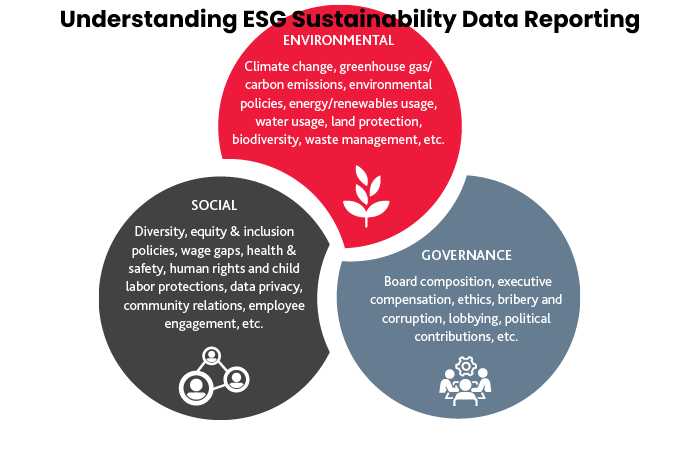ESG Sustainability Data Reporting: ESG sustainability reporting mentions the disclosure of data covering the company’s operations in three areas: environmental, social, and business governance. It provides a snapshot of the business’s influence in these three areas for investors.
Analyzing performance across these ESG factors summarizes quantitative and qualitative disclosures and helps screen investments. ESG reporting helps investors avoid businesses that might pose a greater financial risk due to environmental performance or other social or governmental practices.
Table of Contents
Understanding ESG Sustainability Data Reporting

Environmental: The environmental criterion considers how businesses use energy and manage their environmental impact as stewards of the planet. The “E” believes how a company uses resources from Scope 1 to Scope 3.
Energy efficiency, climate change, carbon production, biodiversity, air and water quality, deforestation, and left-over management. Companies that do not consider these conservation risks may face unforeseen financial risks and investor scrutiny.
Social: The social standard examines how a company fosters its people and culture and how that has ripple effects on the broader community. Inclusivity, gender, diversity, employee engagement, customer satisfaction, data protection, privacy, community relations, human rights, and labor values.
Governance: Governance reflects a company’s internal system of controls, practices, and procedures and how an organization stays ahead of violations. The company’s leadership, board arrangement, executive compensation, audit committee structure, internal controls, shareholder rights, bribery and corruption, lobbying, political contributions, and whistle-blower programs.
It safeguards transparency and industry best practices and includes dialogue with regulators. There has been a massive surge in ESG reporting in the past few years. Numerous companies now integrate their ESG reportage in their annual reporting to demonstrate sustainability in their business.
Why Is ESG Sustainability Data Reporting Important?
While it’s still voluntary for most countries, there are increasing global corporate ESG data reporting regulations. Active and future-focused companies understand the importance of communicating ESG criteria in their commercial strategy and purpose. They are happily providing their ESG data in their annual reporting.
Companies with strong ESG performance have established higher returns on their investments, lower risks, and better resiliency during a crisis. As of July 2020, 90% of businesses in the S&P 500 have already published their annual corporate sustainability/ESG reports.
ESG transparency will be a crucial focus for businesses in 2021 and beyond. Investors increasingly see ESG issues to help manage asset risks. The Deloitte Centre for Financial Facilities expects ESG-mandated assets in the United States to include 50% of all professionally accomplished savings by 2025.
ESG performance improvements and reports show depositors how a company lessens risks and produces sustainable long-term financial returns. ESG performance developments and reports show investors how a company mitigates risks and generates sustainable long-term economic revenues.
On the other hand, corporations that do not offer these reports lack photos, and concerned investors may overlook them as potential savings.
The Challenge
While the request and practice of ESG reporting have enlarged, there still lies an extensive information gap between ESG information and supply. This gap by several factors like varying ESG reporting standards and frameworks, nonmandatory reporting commands, and vertical costs to collect and report data.
These can basket the efforts to offer higher-quality data to investors to inform their decisions. Fortunately, companies can work with specialists to develop and incorporate ESG-balanced plans into their general presentation.
Checklist for ESG Reporting
Build an internal team to make a reporting basis that includes ESG issues, boards, initiatives, performance metrics, and internal and external reporting standards. Conduct materiality valuation and gauge the relative importance of sustainability issues for various investors.
Work with ESG solutions experts who can offer real-time data to map your ESG needs and provide the resources and visions to meet reporting needs that comply with stakeholders, industry, and even non-profit values. Create a compelling message strategy to showcase your ESG running framework and reporting for external and internal stakeholders.
Report your ESG performance and show how it aligns with your business strategy. Frequently work on improving your ESG performance by engaging with stakeholders and understanding emerging sustainability issues affecting your business.
ESG and Sustainability Data
The terms “ESG” and “sustainability” are interchangeable, especially when benchmarking and releasing data. Sustainability is a sunshade term for many green concepts and corporate responsibility, while ESG has become the preferred term for investors and capital markets.
The industry may have started with sustainability efforts, but it has evolved to include ESG practices, presentation, reporting, and relevance to capital chances. ESG data helps identify risk-adjusted returns. Emphasis on all three pillars has aided the change in how companies measure and disclose their performance.
The Difference Between ESG & CSR
The most progressive corporations report on Environmental, Social, and also Governance (ESG) factors and Corporate Social Responsibility (CSR) factors. The difference between ESG and CSR can be confusing because of the inconsistent way that the terms are applied.
In some companies, the Corporate Social Responsibility leader is accountable for the company’s ESG reporting. In other companies, these are separate roles, and also sometimes, they do not even work together.
CSR encompasses all self-imposed and self-regulated activities to make a company more responsible, from setting targets to be carbon neutral but engaging in philanthropy and imposing ethical standards, to reporting on ESG targets. ESG is an effort heavily influenced by governments and investors to have companies write on specific and also material environmental, social, and governance factors.
Conclusion
ESG reporting and disclosures help companies access capital markets and also secure their operating licenses. Strong ESG performance leads to preferential treatment from investors compared to companies whose environmental or other practices may pose a greater financial risk.
Robust sustainability and ESG strategies increase business resilience and help improve overall company performance. With expert help, like Sphere’s ESG solutions, businesses can efficiently navigate through the ESG world. Integrated data and software services include ESG analysis and ESG ratings for overall organizational performance.

